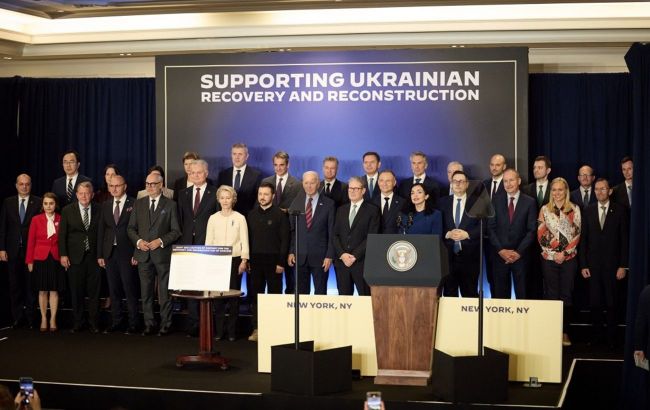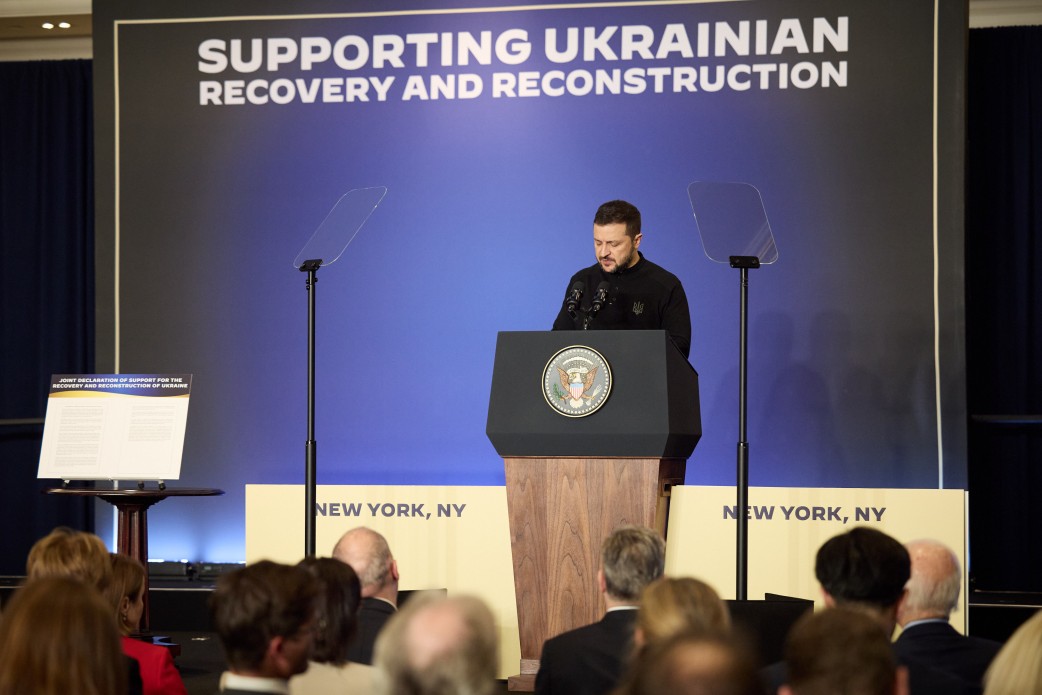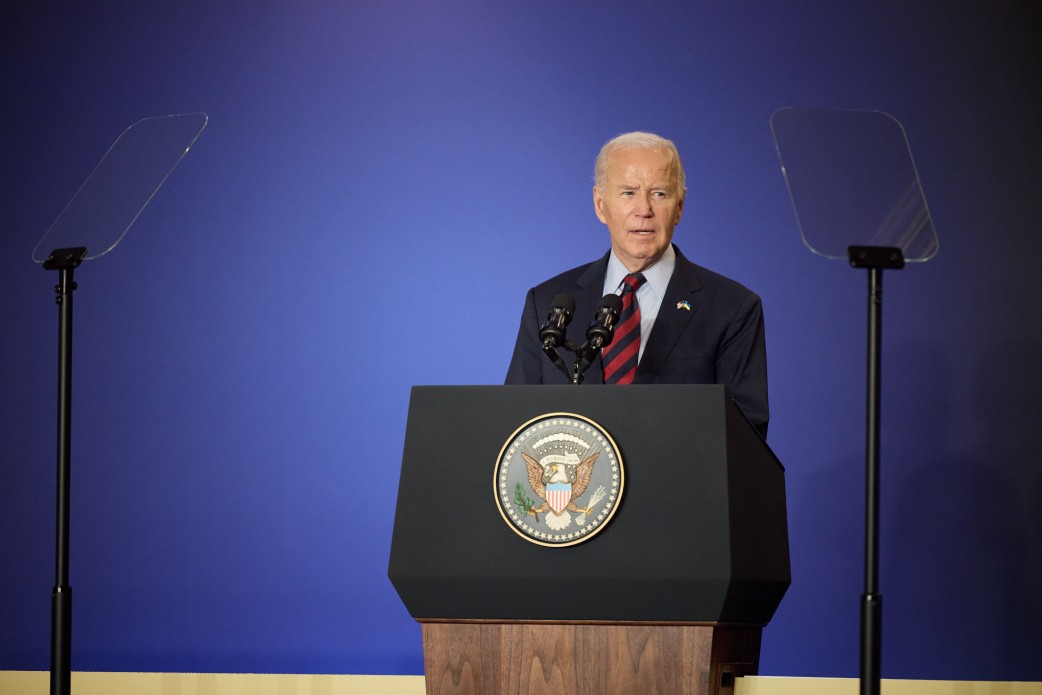EU and over 30 countries adopt Joint Declaration on Ukraine's recovery: Document text
 Photo: leaders on the sidelines of the G7 + Ukraine meeting in New York (president.gov.ua)
Photo: leaders on the sidelines of the G7 + Ukraine meeting in New York (president.gov.ua)
In New York City (USA), during a G7 + Ukraine meeting, a Joint Declaration of Support for Recovery and Reconstruction of Ukraine was adopted. The document was agreed upon by more than 30 countries and the European Union and includes certain commitments from Kyiv, according to the website of the Presidential Office of Ukraine.
During his address at the meeting, Ukrainian President Volodymyr Zelenskyy noted that this joint commitment would facilitate the country’s recovery, and it envisions the coordination of relevant efforts through the Ukrainian Donor Platform.
The head of state also emphasized that this support should become tangible by the end of this year.

President of Ukraine Volodymyr Zelenskyy speaks at the G7+ meeting (photo: president.gov.ua)
US President Joe Biden, in his remarks, announced plans for a series of actions to accelerate support for the Ukrainian military on September 26.
He also stressed that partner countries would assist Ukraine in transitioning from economic resilience to economic revival.
Additionally, according to Biden, revenue from frozen Russian assets will be utilized for the reconstruction of Ukraine.

US President Joe Biden at the G7 + Ukraine meeting in New York (photo: president.gov.ua)
Overall, during the event on September 25, when the declaration was adopted, the following leaders spoke:
- President of Ukraine Volodymyr Zelenskyy
- President of the United States Joseph Biden
- President of the European Commission Ursula von der Leyen
- Prime Minister of the United Kingdom Keir Starmer
- President of the Council of Ministers of Italy Giorgia Meloni
- Prime Minister of Canada Justin Trudeau.
Key points of the declaration
The Presidential Office of Ukraine stated that the main points of the Joint Declaration include:
- Comprehensive support for the reconstruction of Ukraine on its path to EU membership
- Coordination of support through the Ukrainian Donor Platform
- Provision of additional financial assistance of about $50 billion by the end of the year from the proceeds of frozen Russian assets, some of which will be used for defense needs.
"The signatories clearly stated that by collectively supporting Ukraine's reconstruction and recovery, they will ensure Russia's inability to achieve its goals and will do everything possible to ensure that Ukraine has a post-war economy that is resilient to Russian threats," the Presidential Office of Ukraine added.
Text of the declaration and Ukraine’s commitments
The full text of the Joint Declaration of Support for Recovery and Reconstruction of Ukraine was published on the website of the President of Ukraine.
It is noteworthy that the document also outlines Ukraine's commitments to implement a series of reforms, namely:
- Economic
- Judiciary
- Anti-corruption
- Corporate governance
- Defense
- Public administration
- Public investment management
- Law enforcement reforms.
Below is the text of the declaration:
"We, the Leaders of the Group of Seven (G7), reaffirm our unwavering support for Ukraine today and in the future, in war and peace. As stated in the Apulia-G7 Leaders’ Communiqué, together with international partners, we remain determined to provide military, budget, humanitarian, and reconstruction support to Ukraine and its people and are strongly committed to helping Ukraine meet its urgent short-term financing needs and to assisting with Ukraine’s long-term recovery and reconstruction.
We dispel any false notion that time is on Russia’s side or that Russia can prevail by causing Ukraine to fail economically. Russia’s war of aggression has wrought tremendous damage to Ukrainian cities and infrastructure. Today, we reaffirm a series of commitments to counter its effects.
First, Russia’s responsibility under international law to pay for the damage it is causing is clear. We reaffirm that consistent with all applicable laws and our respective legal systems, Russia’s sovereign assets in our jurisdictions will remain immobilized until Russia ends its aggression and pays for the damage it has caused to Ukraine.
Second, we commit to using our economic assistance to ensure Ukraine maintains macro-financial stability, to repair and build critical infrastructure including in the energy sector, to boost economic growth, to support social resilience as well and the implement priority reforms. These include improving the business climate, strengthening anti-corruption efforts, implementing justice system reform, and promoting the rule of law within the context of the EU accession process. We will also support Ukraine to ensure rapid and transparent absorption of donor financing.
Third, we are continuing our joint work to implement the decision made at the G7 Summit in Apulia to launch Extraordinary Revenue Acceleration (ERA) Loans for Ukraine by the end of the year, to make available approximately USD 50 billion in additional funding to Ukraine. The loans will be serviced and repaid by the future flows of extraordinary revenues stemming from the immobilization of Russian sovereign assets held in the European Union and other relevant jurisdictions. Part of these funds will be directed to military assistance to Ukraine. We will maintain solidarity in our commitment to providing this support to Ukraine.
Fourth, we will continue to pursue our vision also by strategizing, coordinating, and steering our support for Ukraine’s economic recovery and reconstruction through the Ukraine Donor Platform. This will include catalyzing private sector contributions as well as leveraging bilateral, European Union, and international financial institution funding, and encouraging Ukraine’s reform agenda given the country’s accession path to the EU. We will continue to support Ukraine’s human capital through our ongoing response to humanitarian needs and social protection.
Finally, we will continue to assess and monitor progress on these commitments through Ukraine Donor Platform meetings and the annual Ukraine Recovery Conference, the next edition of which will be hosted by Italy in 2025.
To implement the above-mentioned commitments, we will each work to provide Ukraine with specific, bilateral support aligned with this joint declaration and with the bilateral security agreements and arrangements that have been negotiated and signed with Ukraine.
For its part, Ukraine is committed to implementing its economic, judiciary, anti-corruption, corporate governance, defense, public administration, public investment management and law enforcement reforms. These reforms are necessary and will be vital to enabling long-term support for Ukrainian reconstruction and recovery.
Our message is clear: we remain committed to the strategic objective of a free, independent, democratic, and sovereign Ukraine, within its internationally recognized borders, that is prosperous and able to defend itself. We highlight the importance of an inclusive and gender-responsive recovery and the need to address the different needs of women, children, and disabled persons as well as other population groups who have been disproportionately affected by Russia’s war of aggression.
Through our collective support for Ukrainian reconstruction and recovery, we will ensure that Russia fails in its objectives to subjugate Ukraine – and that Ukraine emerges from Russia’s war of aggression with a modernized, vibrant, inclusive society and innovative economy, resilient to Russian threats. Other countries that wish to contribute to this effort in support of Ukraine’s long-term reconstruction and recovery may join this Joint Declaration at any time."
Earlier, the Verkhovna Rada of Ukraine explained why it is essential to create recovery programs for communities now.
Additionally, RBC-Ukraine recently reported that the Presidential Office is uncertain when Ukraine will receive $50 billion backed by Russian assets.

